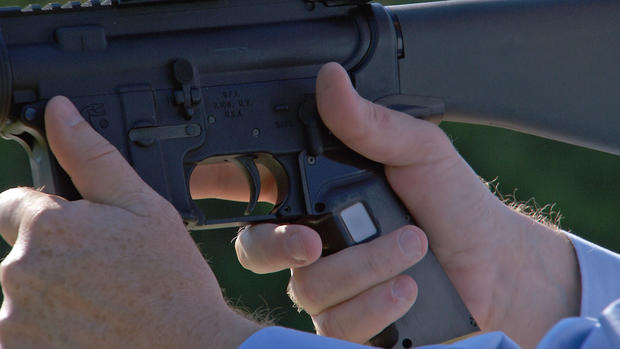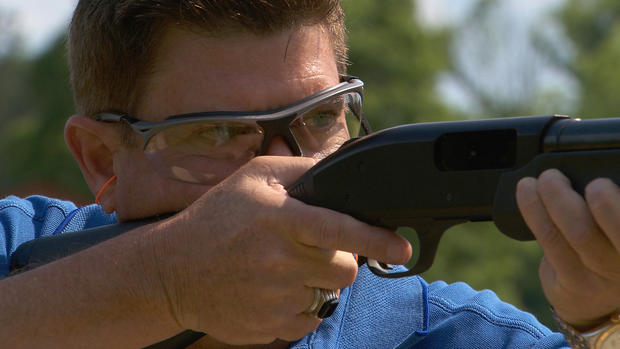Is the U.S. ready for smart guns?
The following is a script from "Smart Guns" which aired on November 1, 2015. Lesley Stahl is the correspondent. Shachar Bar-On, producer.
Every time there's a massacre at a school, like the recent one in Oregon, it reignites the debate for more gun control -- not only because of the mass shootings, but because of the hundreds of incidents of gun violence every day on our streets and in our homes. One idea that keeps coming up is smart guns. These are firearms that only work when they're fired by their owner. It seems that "gee whiz" technology is seeping into every corner of our lives. Why not guns?
In the 2012 movie "Skyfall," Q gives James Bond a smart gun that only he can activate.
[Q: It's been coded to your palm print so only you can fire it.]
Later, when the bad guy gets a hold of it --
[Bond: Good luck with that.]
Firearms that recognize only their owner aren't just the stuff of movies. Army veteran Tom Lynch is developing a touchpad scanner that recognizes fingerprints, like an iPhone. Add it to an existing gun -- and it's a smart gun.
Lesley Stahl: So it's recognizing you? There you go--
Tom Lynch: It's recognizing me.
Lesley Stahl: OK. (gun shots) Now? Now.
Tom Lynch: --it's unlocked. It's still on "fire."
Lesley Stahl: Let me try it. Let's see if I can -
Tom Lynch: Now pull the trigger.
Lesley Stahl: I can't even pull the trigger. Oh.
Tom Lynch: That's the point.
Lesley Stahl: It's locked.
Tom Lynch: It's locked.
Other inventors are working on guns that recognize the squeeze of your grip, or unlock wirelessly if the shooter wears a watch or a ring. These guns would not have prevented many of the mass shootings because the gunmen owned the firearms, but smart-gun advocates say they could counter this all-too-common grim reality:
[News report: A 14-year-old boy accidentally shot and killed his 9-year-old brother.]
Children shot and killed by other children.
[News report: A tragic shooting, two friends playing with a gun when it goes off.]
Smart guns could curtail the number of suicides, and cut down on the resale of stolen guns; estimated to be 230,000 every year. What good is a gun no one but the owner can fire? And they would help on-duty cops.
[News report: There was a struggle and Clark grabbed Officer Smith's gun and shot him two times.]
And yet, with at least a half-dozen smart guns in advanced development and some ready for manufacturing, no major U.S. gun company is making them, and no gun dealer is willing to sell them. Why? Well, consider what happened to one Maryland gun dealer who tried.
[Andy Raymond in store: I like the way Sterling Arsenal actually painted this thing...]
Last year, Andy Raymond, co-owner of Engage Armament, announced he'd sell the Armatix iP1, a smart pistol made in Germany.
Lesley Stahl: Who did you think would be interested in that kind of a gun?
Andy Raymond: Typically, what I like to call "fence sitters." So people who aren't normally into guns and don't normally want one. You know, "Eh, I'm too afraid" or whatever.
Lesley Stahl: Did you anticipate the reaction that you got?
Andy Raymond: No.
Within minutes of his announcement, angry emails and phone calls started coming.
Andy Raymond: We got about 2,000 phone calls and maybe about the same emails.
Lesley Stahl: All against?
Andy Raymond: Yeah, that was just in one day. I mean, it was insane. I mean, one person threatened to burn down the shop, another person threatened that I would be raped, that was classic.
Lesley Stahl: You would be raped?
Andy Raymond: Yeah.
Lesley Stahl: Did you get any death threats?
Andy Raymond: Yeah. The crazies did come out of the woodwork.
That's him that night, shaved head and whiskey bottle at his side. He stayed in his store to guard it and posted this video on Facebook:
[Andy Raymond in Facebook video: So anyway, obviously I received numerous death threats today. I really (bleep) appreciate that. I think that's (bleep) classy. That's a great thing for gun rights when you threaten to shoot somebody.]
He thinks the campaign against him was viral, not organized by the gun lobby, though in his rant, he wondered why gun lovers and the National Rifle Association, would oppose the sale of any gun.
[Andy Raymond in Facebook video: How can the NRA or people want to prohibit a gun when we're supposed to be pro-gun? We're supposed to say that any gun is good, in the right person's hands. How can they say that a gun should be prohibited? How hypocritical is that?]
Andy Raymond: If you believe in the Second Amendment, and the Second Amendment is absolute, that the right of people to keep and bears arms shall not be infringed, then you should be able to buy whatever you want.
What Andy didn't realize is that there's a long beleaguered history to these devices: 15 years ago gunmaker Smith & Wesson promised the Clinton White House to develop smart guns as part of a deal to fend off liability litigation.
"If you believe in the Second Amendment, and the Second Amendment is absolute, that the right of people to keep and bears arms shall not be infringed, then you should be able to buy whatever you want."
[Clinton presser: Under the agreement, Smith & Wesson will develop smart guns that can be fired only by the adults who own them.
The gun lobby organized a boycott against Smith & Wesson -- seeing smart guns and other concessions in the deal as part of the gun control agenda. Factories closed, employees were laid off, and after that, no big U.S. gunmaker ever went near a smart gun.
Steve Sanetti: There's a lot of skepticism and a lot of resistance to them.
Steve Sanetti, president of the gun lobby and trade group the National Shooting Sports Foundation, represents over 12,000 gunmakers, dealers, and businesses.
Lesley Stahl: Does your organization see the smart gun as gun control?
Steve Sanetti: People that own guns are not the ones saying, "I'm the one that wants this. Please develop it." It's coming from the gun control side. It's coming from people who, frankly, really want to put as many obstacles to a gun going off as they can.
Lesley Stahl: Why are dealers who want to sell it...why are they being intimidated not to? Why not let the market decide? People don't want it, don't buy it.
"People that own guns are not the ones saying, 'I'm the one that wants this. Please develop it.' It's coming from the gun control side."
Steve Sanetti: Well, I agree. We think the market should be able to decide that. We have never fought the idea that dealers can put them on the shelves. It's totally up to the marketplace and the dealers.
Lesley Stahl: So where is that fight coming from?
Steve Sanetti: That's the point. People don't understand the passion that firearms owners have for the firearms that they own.
The passion has been fueled by the NRA which says on its legislative website -- smart guns could open the door to a ban on all other guns. Why do they say that? Well, it's actually happened! In 2002, New Jersey's governor signed a law that became known as "the mandate."
Steve Sanetti: There is a statute in the state of New Jersey that would say that once a gun like this is offered for sale anywhere, that's the only kind of gun that could be sold.
Lesley Stahl: If these guns are sold in Wyoming or California, this triggers the law?
Steve Sanetti: Uh-huh (affirm).
Lesley Stahl: -- that everybody in New Jersey has to have that.
Steve Sanetti: Right.
Loretta Weinberg, the New Jersey state senator who authored the law, didn't foresee its consequences.
Loretta Weinberg: We passed that bill to help spur this technology.
Lesley Stahl: It appears it totally backfired because it spurred this passionate objection to the gun.
Loretta Weinberg: Because of the intervention of the NRA and the Second Amendment folks.
Lesley Stahl: That, they say, the reason they intervened is because of the mandate.
Loretta Weinberg: Right. It isn't the law that's stopped the development. It is the people who threatened folks who actually wanted to sell such a gun.
Andy Raymond came to realize that even if he had sold the Armatix gun in Maryland, it might've triggered the mandate, banning the sale of regular handguns in New Jersey.
[Andy Raymond: The people of New Jersey: my apologies. You got nothing to worry about from me.]
Andy Raymond: I did apologize. I'm... I'm sorry. Sorry to this day.
Lesley Stahl: Did you actually sell any of the Armatix guns?
Andy Raymond: No.
After his case came to her attention, the New Jersey senator offered to rescind the mandate if the gun lobby publicly removed its opposition to smart guns. She's yet to hear back.
Loretta Weinberg: They seem to oppose almost everything. Anytime we suggest anything we've gotten very little cooperation back.
Lesley Stahl: If the law were completely repealed, do you think that the gun lobby would then let this go forward?
Loretta Weinberg: No.
Steve Sanetti: Why are you trying to take my firearm which I store safely and properly and I've never had problems with it, and add something to it that's gonna make it more prone to failure?
Lesley Stahl: What about the argument that we have seat belts. We have air bags, they're mandatory.
Steve Sanetti: Uh-huh (affirm).
Lesley Stahl: Why not make a safe gun mandatory?
Steve Sanetti: Firearms are safe. The firearms manufacturers include appropriate locking devices for their guns along with them when they're shipped. They may be low-tech, but they work.
He says adding high-tech to guns may make them less safe. For example, the batteries that operate the smart guns.
Steve Sanetti: We've all had battery-operated devices where the battery dies.
Lesley Stahl: So the people who are working on this tell us that the batteries will have a 10-year life -
Steve Sanetti: What about the 11th year?
Lesley Stahl: Well, you change the battery.
Steve Sanetti If you remember. If -
Lesley Stahl: No, you're going to get a warning.
Steve Sanetti: If the gun is stored inside a cabinet, or box, or a safe or something like that, you might not see the warning.
Other concerns: will fingerprints work in snow and rain? Will they work if you're sweating because an intruder entered your home? Could guns using wireless technology be hacked or jammed and disabled remotely by the government?
Steve Sanetti: We have to be careful not to fall into the technology trap. It doesn't solve every problem. It's great. We're not Luddites. We're not here saying that technology is a bad thing. Technology obviously improves our life in many ways. But I think you have to look at firearms in a slightly different way. Their mechanisms are the way they are over centuries of development. They're at the state now that consumers want them and, in the United States, there's a lot of tradition involved firearms. People like guns of the Old West, they like them the way Davie Crockett used them; they like them the way they were used years ago.
That was the case a decade-and-a-half ago, as Jonathan Mossberg found out. He had left his family's gunmaking business, Mossberg & Sons, and invented a smart gun that works in conjunction with a ring.
Lesley Stahl: Do I get -- get my own, right?
Jonathan Mossberg: Yeah. You get your own ring.
The ring has a tiny computer chip inside a black stone which transmits a signal. When it's close to the trigger, it unlocks the gun:
[Lesley shoots gun.]
Jonathan Mossberg: Alternatively, if I were to grab it, you know, nothing happens.
Mossberg's gun was ready to sell 13 years ago, but...
Jonathan Mossberg: People weren't really...there was some market, but not enough. So we decided not to sell it.
Lesley Stahl: And has something changed?
Jonathan Mossberg: Yes. We all started living with these evil things (holds up smartphone). And so we became comfortable trusting it. They guide us to our destinations. They make sure we're OK for meetings, and they're extremely reliable.
He thinks that today's young parents, comfortable with technology, are a ripe market. And Silicon Valley agrees.
Ron Conway: This is going to happen outside the gun industry. Why they aren't doing research and investing in this baffles me.
Ron Conway, one of the early investors in Facebook and Google, is now looking for, he says, the Mark Zuckerberg of guns. He has funded at least 15 smart gun inventors, including those involved in the two guns we tested.
Lesley Stahl: Are you thinking that if the gun manufacturers don't come along, that they're going to be like Kodak?
Ron Conway: Absolutely.
Lesley Stahl: This is what you're saying.
Ron Conway: Yes. Kodak and Polaroid all wrapped in one. You cannot stop innovation. And this is an area where innovation is taking over.
Lesley Stahl: Are you not worried about the politics of this whole issue?
Ron Conway: I think for technology and innovation we have to ignore politics.
Lesley Stahl: Can you?
Ron Conway: Of course you can.
But when it comes to guns, it's all about politics. Just ask Andy Raymond.
Andy Raymond: I got caught up in the middle of something that was way beyond me, way beyond my capabilities and got caught between two sides that I mean, it was just-- I will never, ever, ever touch anything else like that ever, ever again.
As of today, you cannot find a smart gun to buy in the United States. Senator Loretta Weinberg told us that she plans to ask the New Jersey state legislature to repeal the mandate - but replace it with a demand that dealers display at least one smart gun in their stores. Question is: will dealers be too gun-shy?
Lesley Stahl: If this gun does take off, would you sell it?
Andy Raymond: Absolutely not.
Lesley Stahl: Ever?
Andy Raymond: I would rather be shot by a smart gun than sell one.


